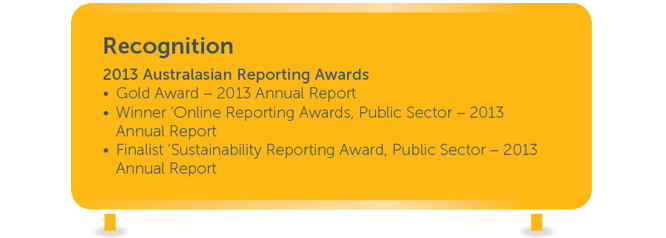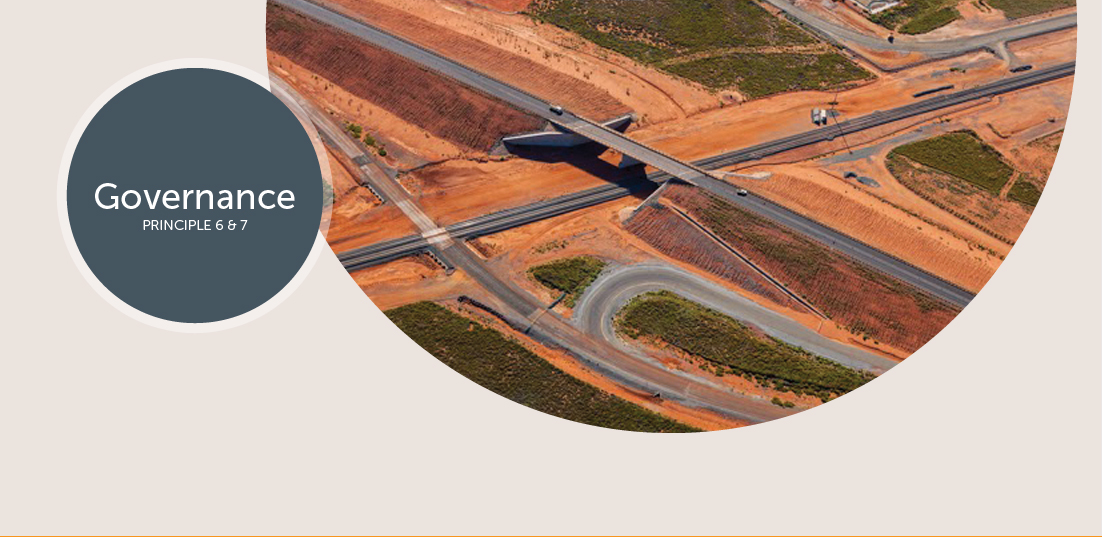
Principle 6: People
Further information on People can be found in the Developing Capabilities section.
Our Recruitment Practices
This year we moved the management of the selection and recruitment process back in house, removing the need for external human resource consultants. The shift in process came from our focus on delivering value to the community. Returning the selection function in-house has resulted in savings of $151,000.
We are moving towards a business partnering approach for OD services with the rest of the organisation. Ultimately this will provide an opportunity to build relationships across the organisation, enhance strategic alignment, increase manager engagement with selection and aid in the retention of internal knowledge and expertise in selection processes and our work force.
Equal Employment Opportunity Management Plan 2011-2015
We consider diversity to be respecting, recognising and utilising the many different backgrounds, skills, talents and perspectives of our workforce. The Equal Employment Opportunity (EEO) Management Plan is developed in accordance with Part IX of the Equal Opportunity Act 1984 and is aligned to the Office of Equal Employment Opportunity’s outcome standards framework:
- The organisation values EEO/diversity and the work environment is freed from racial and sexual harassment.
- Workplaces are free from employment practices that are biased or discriminate unlawfully against employees or potential employees.
- Employment programs and practices recognise and include strategies for EEO groups to achieve workforce diversity.
- We continued to focus on improving development and promotional opportunities for women through our Women in Management Strategy and Action Plan. For more information, please refer to the Developing Capabilities section.
We have implemented a new framework which enhances our Indigenous traineeship opportunities across the organisation. Through partnerships with the ROADS Foundation and a streamlined approach, we are able to provide tailored traineeships on an ongoing basis. The Equity Index table below shows how we track areas of diversity.
Equity Index
| Areas of Diversity | 2012 | 2013 | 2014 | |||
| R | I | R | I | R | I | |
|---|---|---|---|---|---|---|
| Women | 29.8% | 54.8 | 29.1% | 54.9 | 29.8% | 59.8 |
| Culturally Diverse Background | 9.8% | 114.3 | 17.5% | 92.1 | 17.4% | 91.5 |
| People with Disabilities | 1.8% | 80.3 | 3.6% | 85.1 | 3.2% | 97.5 |
| Indigenous Australians | 0.9% | 17.1 | 1.8% | 35.7 | 1.8% | 40.7 |
| R: Representations I: Index | ||||||
Individual Performance Agreement
The Individual Performance Agreement (IPA) process helps employees to identify their performance objectives, competencies for development and developmental needs for the coming year. The process is designed to provide a framework in which employees can discuss their technical capabilities ensuring the organisation has the right skills, knowledge and expertise to provide a sustainable workforce that meet organisational needs.
At a corporate level, the Human Capital data collected from the IPAs is used to identify and manage skill gaps across the organisation. Together with workforce planning data, the information is used to develop corporate programs and short training courses.
Our new online Employee Development System was launched in July 2013. Supporting the IPA process, a record 90% of Main Roads staff engaged with the new system, representing the highest rate ever achieved at Main Roads.
For more information about the online Employee Development System please refer to Developing Capabilities.
Compliance with Public Sector Standards and Ethical Codes
Compliance issues that arose during the year regarding the Public Sector Standards included lodgement of two breach claims against recruitment, selection and appointment processes and one against the Grievance Standard, all which were subsequently dismissed.
Every year we take steps to enhance processes to ensure compliance including:
- Providing information about Public Sector Standards and Codes of Conduct on our intranet and including this information in induction material
- Correspondence to applicants for recruitment, selection and appointment processes with details on how to access the Public Sector Standards
- Ongoing training provided to recruitment and selection panel members to ensure compliance with relevant Public Sector Standards
- Providing an experienced independent person for all recruitment and selection panels
- Providing a network of Grievance Officers across the State
- Reviewing and auditing all recruitment, selection and appointment processes both permanent and temporary, to ensure compliance with Public Sector Standards.
Principle 7: Finance
Reporting to the Department of Treasury
There is a requirement to provide monthly, quarterly and annual information to the Department of Treasury, which is subject to audit by the Office of the Auditor General. This also serves as an independent check on the integrity of financial reporting.
Accounting and Financial Management Policies
A comprehensive Financial Management Manual containing accounting and financial management policies and procedures is maintained together with Control Self-Assessment Checklists.
These documents communicate accountability for procedures within various responsibility areas and enhance the level of internal control. The Manual and Checklists enable management as well as internal and external auditors to monitor compliance with established procedures and, together with the Financial Management Act 2006 and the Treasurer’s Instructions, are available online to all employees.
Capital Works
All disclosures in relation to capital works are included in the Financial Statements. Our Strategic Asset Management Plan, produced annually through our third party certified Asset Management/Investment Planning processes, details our 10-year investment needs and drivers. The Strategic Asset Plan adheres to WA Treasury’s Strategic Asset Management Framework.
We assess projects for funding based on their economic, environment and social impacts. Each capital project follows the national Austroads project evaluation methodology where a Benefit Cost Ratio (BCR) must be conducted. This incorporates quantifiable economic data and is supplemented by simplified economic, environmental and social assessments.
The BCR records information on the benefits of a project on travel time savings, vehicle operating costs and smoother travel, safety, and maintenance. Other benefits and costs are considered via a multi-criteria analysis. Capital works financial progress is reported to the Budget Committee on a monthly basis.
Internal Audit
A comprehensive system of internal controls is in place to ensure that there is an appropriate division of responsibilities to safeguard the assets and financial interests of the organisation. The Management Review and Audit Branch is responsible for managing our internal audit function, providing independent, objective assurance and consulting activities.
The Branch is designed to add value, improve operations, and bring a systematic, disciplined approach to evaluate and improve the effectiveness of risk management, operational controls and governance processes.
The Management Review and Audit Charter establishes the responsibility of the Management Review and Audit function and sets out to ensure it performs effectively in the organisation.
For approved areas of review where the branch does not possess all the necessary experience/skills, additional ‘in-house’ or external consultants are utilised.
The function of the Management Review and Audit Branch provides the Managing Director of Main Roads and the Corporate Executive with:
- Objective constructive and independent assessments of the extent to which
- Financial, human, intellectual and physical resources are managed with due regard to economy, efficiency and effectiveness and
- Accountability relationships are reasonably served
- Assurances as to the reliability of accounting and financial management information and the protection of assets and resources under control
- Assessment of the organisation’s compliance with legislation and relevant policies and procedures
- Assessment of audit reports issued by the Office of the Auditor General and the relevance and possible impact on Main Roads
- Independent and confidential advice on remedial action to improve operational effectiveness, efficiency and economy
- Progress reports regarding remedial action taken by line management
The Branch reports quarterly to the Management Review and Audit Committee and maintains a regular review of audit plans, reports and working papers.
Statutory Audit
The annual independent external audit on controls, compliance and assurance is carried out by the Auditor General of Western Australia, in accordance with the Auditor General Act 2006. The Auditor General’s opinion is addressed to both Houses of the Parliament of Western Australia and his office audits our financial statements, controls and key performance indicators. These audits provide an independent opinion on whether Main Road’s financial statements are true and fair and are in accordance with the Australian Accounting Standards and the Treasurer’s Instructions.
Management Reporting
Financial reports are tabled monthly and quarterly at the Budget Committee comprising all Executive Directors and chaired by the Chief Finance Officer. Key financial highlights are reported monthly to Corporate Executive along with progress against Key Financial Performance Indicators. In addition regions and branches conduct monthly reviews over their finances with financial reports presented at Directorate Management meetings.
Pricing Policies of Services Provided
The supply of goods and services we undertake represents works and services carried out for other public sector and private bodies on a cost recovery basis. Further details are available in the Notes to the Financial Statements.


